|
McG
Datum registracije: Feb 2014
Lokacija: Varaždin
Postovi: 8,685
|
Citiraj:
AMD 5th Gen EPYC Turin CPUs launched: Up to 37% IPC increase, up to 192 Cores, 500W TDP, 5.0GHz clocks & significantly outperforming Xeon
Citiraj:
For its 5th Gen EPYC lineup, there are going to be two solutions. The 4nm version of Turin with up to 16 "Zen 5" CCDs, offering up to 128 cores and 256 threads, which is referred to as the "Scale-Up" variant while the second one is the "Scale-Out" variant which utilizes the 3nm "Zen 5C" cores with up to 12 CCDs, offering up to 192 cores and 384 threads. Turin packs up to 17 chiplets with a total of 150 Billion transistors for the full chip. The CPUs will come with AVX-512 support with a full 512b data path & up to 5 GHz clock speeds. Chips can be configured in 1P or 2P servers. In terms of IPC improvement, AMD states that Zen 5 delivers "exceptional uplifts" over the previous generation with up to a 17% increase for Enterprise and Cloud platforms and up to a 37% increase for HPC and AI platforms. The lineup scales from 8 cores to up to 192 cores and TDPs scale from 155W to up to 500W. As for the platform itself, AMD is relying on the same SP5 socket for both variants of Turin which makes it an easy drop-in upgrade from the previous Genoa and Bergamo "Zen 4" releases.
The platform still offers a 12-channel memory solution but now has DDR5 speeds configured up to 6400 MT/s with ECC support, 6 TB capacities per socket & you still get 128 PCie 5.0/CXL 2.0 lanes. New on Turin is support for PPR or Dynamic Post Package Repair for x4 and x8 ECC RDIMMs. On the security front, you get Trusted I/O, FIPS 140-3 in process, and Hardware Root-of-Trust support. The 5th Gen AMD EPYC "Turin" lineup will consist of a total of 27 SKUs which include the EPYC 9965 as the 192-core "Zen 5C" flagship, the EPYC 9755 as the 128-core "Zen 5" flagship, and the EPYC 9575F "Zen 5" chip as the first 5 GHz EPYC SKU. Moving to the details of the flagship SKUs, the AMD EPYC 9965 will feature 192 cores, 384 threads, and 384 MB of L3 cache. This chip will feature a 2.25 GHz base clock and a 3.7 GHz boost clock. The CPU will be configured at a default TDP of 500W and will be priced at $14,813 which is significantly lower than Intel's top Xeon 6900P offering which is priced at $17,800 US. That's a 17% higher price for Intel's flagship offering with 128 cores.
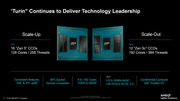 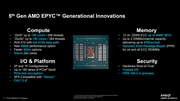 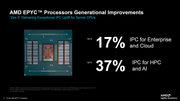 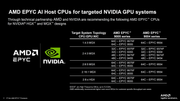 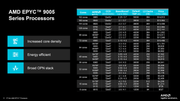 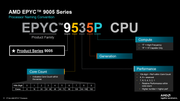
The EPYC 9755 which is based on the standard Zen 5 cores will come configured with 128 cores, 256 threads, 512 MB of L3 cache, a base clock of 2.7 GHz, a boost clock of 4.1 GHz, and a TDP of 500W. This chip will feature a price of $12,984 US which is again much lower than Intel's 6980P chip, marking a -27% difference. AMD also has several frequency-optimized variants in 64, 48, 32, 24, and 16 core flavors. The top part is the EPYC 9575F which offers 64 cores, 128 threads, 256 MB of L3 cache, a 400W TDP, a base clock of 3.3 GHz, and a boost clock of 5.0 GHz. This chip is priced at $11,791 US. Lastly, we should mention the entry-level 8-core SKU, the EPYC 9015, which is configured with a 125W TDP and has a base clock of 3.6 GHz, and a boost clock of 4.1 GHz and 64 MB of L3 cache. This chip will cost $527 US.
AMD is also outlying its EPYC platform to be used as an AI Host CPU for AMD Instinct and nVidia MGX/HGX platforms. The solution can be equipped with up to 8 OAM MI300X or MI325X GPUs & configurations that use the EPYC 9575F 5 GHz chip and can see up to a 20% performance increase in AI inferencing and up to 15% uplift in training. For nVdiia, the MGX solutions can be equipped with up to 16 AI accelerators (Hopper/Blackwell) and HGX configurations can get up to 8 accelerators with up to 2 EPYC CPUs. AMD & nVidia have announced a technical partnership, recommending a range of EPYC CPUs ranging from 32, 48, and 64 cores.
|
Izvor: Interneti
|
Citiraj:
The tested AMD EPYC 9575F high frequency Turin 64-core processor, EPYC 9755 128-core Turin processor, and EPYC 9965 192-core Turin Dense processors dominated across the wide variety of server / technical computing / HPC workloads tested. The dual 128-core EPYC 9755 Turin processor was 40% faster than the dual Xeon 6980P Granite Rapids server with MRDIMMs. Even a single EPYC 9755 (and EPYC 9965) effectively matched the dual Xeon 6980P processors in this larger selection of benchmarks than what was initially run for Granite Rapids. The EPYC 9755 flagship Turin (non-dense) processor was 1.55x the performance of the 96-core EPYC 9654 Genoa processor. The EPYC 9965 192-core Turin Dense processor was 45% faster as well than the dual EPYC 9754 flagship Bergamo processor. These are some wild generational improvements.
Across all of the benchmarks, the EPYC 9965 had an average CPU power consumption of 275 Watts and a peak of 461 Watts, the EPYC 9575F had an average of 313 Watts and a peak of 403 Watts, and the EPYC 9755 had an average power consumption of 324 Watts with a peak of 500 Watts. The Xeon 6980P meanwhile had a 322 Watt average and 547 Watt peak. The tested AMD EPYC 9005 series processors delivered excellent generational performance gains over the EPYC 9004 series, leading performance over the new Xeon 6900P Granite Rapids series, and completing the trifecta is leading performance-per-dollar as well. The EPYC 9755 has a list price of $12,984 and the EPYC 9965 192-core processor has a list price of $14,813 while the Xeon 6980P has a list price of $17,800. There is significant savings in going for EPYC 9005 series.
|
 
__________________
AMD Ryzen 9 9950X | Noctua NH-U12A chromax.black | MSI MAG B650 Tomahawk Wi-Fi | 128GB Kingston FURY Beast DDR5-5200 | 256GB AData SX8200 Pro NVMe | 22TB WD Red Plus | Fractal Define 7 Compact | Seasonic GX-750
AMD Ryzen 5 7600 | Noctua NH-U12A chromax.black | MSI MAG B650 Tomahawk Wi-Fi | 128GB Kingston FURY Beast DDR5-5200 | 256GB AData SX8200 Pro NVMe | 2x12TB WD Red Plus | Fractal Define 7 Compact | eVGA 650 B5
AMD Ryzen 5 7600 | Scythe Kotetsu SCKTT-1000 | MSI MAG B650 Tomahawk Wi-Fi | 64GB Kingston FURY Beast DDR5-5200 | 256GB AData SX8200 Pro NVMe | 2x8TB WD Red Plus | Fractal Define 7 Compact | Seasonic SSR-550PX
Zadnje izmijenjeno od: The Exiled. 10.10.2024. u 22:14.
|